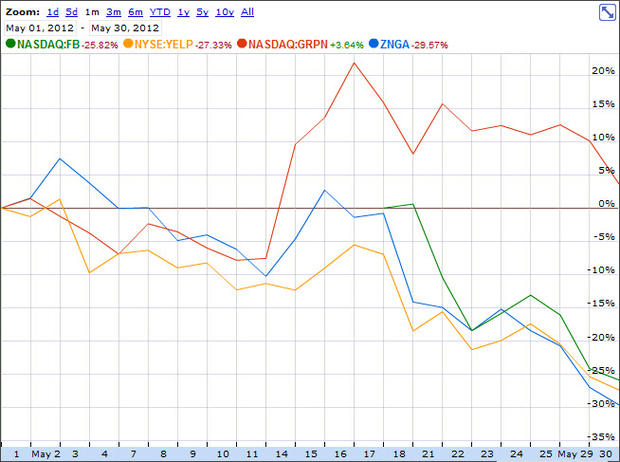Facebook deflates the bubble its IPO floated on
(MoneyWatch) Facebook (FB) has become the poster child for how fickle Wall Street and investors can be be. Not even two weeks ago it had a market valuation of $104 billion. Today? Barely over half of that as the value of its stock and that of other recently public tech high fliers have taken a spinning nosedive. The situation raises the question of whether Facebook did no more than ride an expanding tech bubble to its IPO, only to prick the bubble and damage the prospects of upcoming tech IPOs, at least in the near future.
Ever since that Friday morning when technical problems on Nasdaq delayed the start of the biggest tech IPO ever and kept traders from seeing whether their trades had gone through, Facebook's shares have been sliding. As of Wednesday's close, the price was 26 percent below the IPO price of a week-and-a-half earlier. As of today, according to Google Finance, Facebook's market cap is $57.8 billion. Bloomberg, looking at Facebook's price compared to its projected 2012 earnings, wonders if shares could slide another 20 percent. At its current price, Facebook is selling for about 29 times estimates of 2014 earnings.
Why Facebook bankers nailed the IPO price
Complete coverage: The Facebook IPO
Facebook isn't the only technology company that has seen a major slip in its share price. Daily deal company Groupon (GRPN), consumer review site Yelp (YELP), and Facebook gaming partner Zynga (ZNGA) have all kept the social networking giant company on the way down. The graph below, from Google Finance, shows the sharp downward slope since Facebook's IPO on May 18.
Some have argued that there has been no tech bubble -- no artificially high value set on social and Internet companies and what they delivered to users, customers, and investors. High profile tech investor Marc Andreessen made this claim as May 1 2012. (May Day, aka mayday, an international signal of distress.) Already tech companies have begun postponing IPOs as a result.
There are people in and around tech, like Business Insider analyst Pascal-Emmanuel Gobry, who argue that technology stocks are actually under-valued:
Facebook is valued at less than 10x next year's revenue for a business with strong network effects, unparallelled engagement, 20% net margins growing 50% y/y, etc. and just a completely unique, era-defining company. To be sure, there are lots of questions about Facebook's business, and there have been lots of shenanigans around the IPO, but the point is that a company that everyone thought was worth $100 billion a few weeks ago is now worth $60 billion and still crashing.Move out of the tech-centric crowd, though, and you begin to hear significantly different opinions. Corey Schottenstein, portfolio manager and general partner of buy-side institutional investor Schottenstein Capital Partners, blogged on Seeking Alpha to expect a $15 Facebook price in the coming quarters:
The only conclusion to make as to how the enterprise value of Facebook has increased by over 300% since The Social Network is that investors are pouring their money into the pool, and thus, tangibly making the intrinsic value of the company's intangible assets grow larger and larger. And if that's the case, this thing is going to bubble harder than the U.S. housing market in 2006.
Felix Salmon at Reuters argues that private markets like SecondMarket helped drive Facebook valuation to degrees that were not sustainable. Salmon compares tech companies before they go public as acting like fine art objects: "a place for the rich to spend lots of money and feel great about owning something very few other people can have." When the stocks go public, they immediately become democratic, losing "their cachet" and, with it, "a lot of their value."
Perhaps the problem, though, is even more basic. As Larry Swedroe, principal at Buckingham Asset Management and MoneyWatch columnist notes, investor sentiment can cause stock mispricing. The best way to avoid a bubble is not to going the herd in chasing it.
Image: morgueFile user kahle

